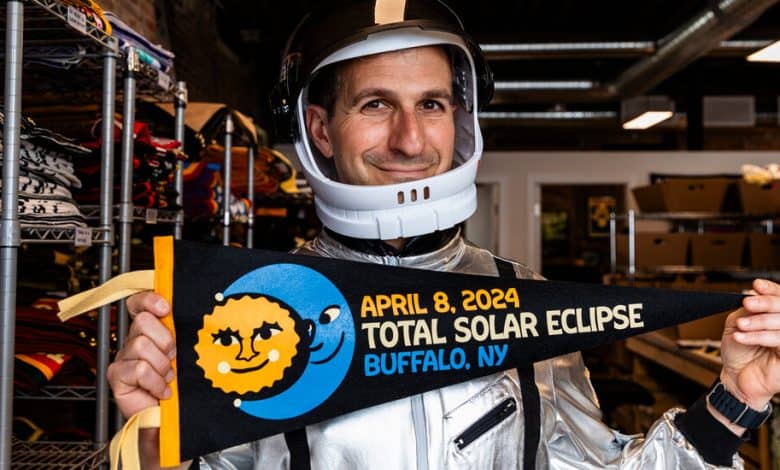A Dark Day Is Coming for Buffalo. It Can’t Wait.

When the sky above Buffalo briefly goes dark on the afternoon of April 8, the city will transcend its dreary place in the public consciousness — measured as it so often is by snowstorms and Super Bowl shortcomings — if only for about three minutes.
After that, it’s up to Buffalo to make the most of its moment in the sun (or should that be: out of the sun?), when it will be met with an estimated one million eclipse tourists. Owing to the city’s excellent vantage for witnessing a rare total eclipse, nearly every room in every hotel in the region is booked, the campgrounds are almost full and good luck finding a rental car anywhere along the Erie Canal.
“For a couple of minutes the whole world will be thinking about Buffalo,” said Dave Horesh, the co-founder of Oxford Pennant, a local felt flag factory. Mr. Horesh ran a nationwide sweepstakes called “The Best Seat in the Universe,” and is flying the winner to Buffalo to watch the eclipse from a love seat on the lawn of a former mental institution now converted into a boutique hotel. “I was thinking: All this city has ever been known for is bad sports teams, snow and chicken wings,” he said. “This is an opportunity.”
Buffalo’s Erie County and nearby Niagara County lie in what astronomers call “the zone of totality,” a band stretching from Dallas to Montreal in which the moon will fully block out the sun. Officials in the region first realized that the eclipse would be a big deal seven years ago — that’s when, in 2017, the area’s tourism agency received its first group tour booking: 56 people in a bus from Pennsylvania, according to Patrick Kaler, the president and chief executive of Visit Buffalo Niagara.
Officials have spent the past year getting ready in earnest, poring over white papers on how comparable cities have handled past eclipses, Mr. Kaler said. Regular meetings brought together emergency medical workers, astronomers and even an ophthalmologist to answer anxious questions about eyeballs and eclipses.
The visitors expected in Buffalo could nearly double the area’s population, jam traffic and overload cellphone signal capacity. To mitigate the concerns, the region has collaborated with cellphone companies to bring in mobile units to boost signals, and will be staging ambulance and emergency crews across the area to better reach people in need, according to Mark C. Poloncarz, the Erie County executive.